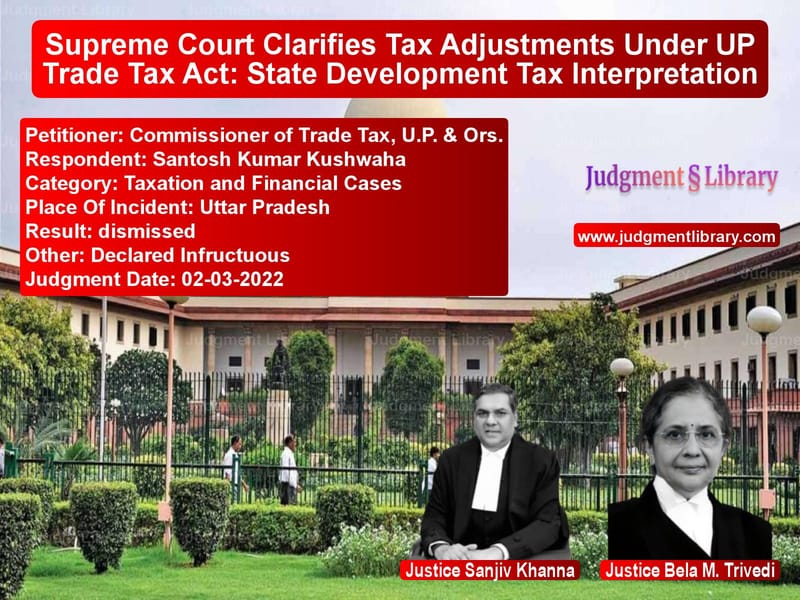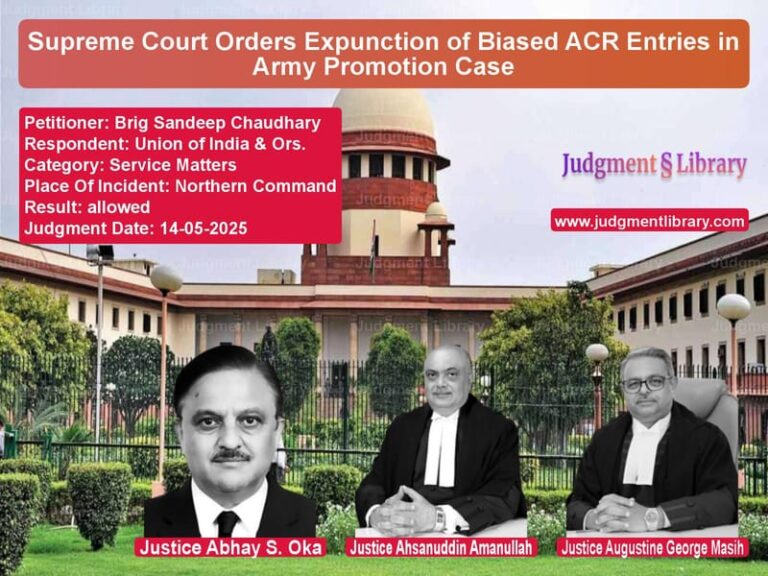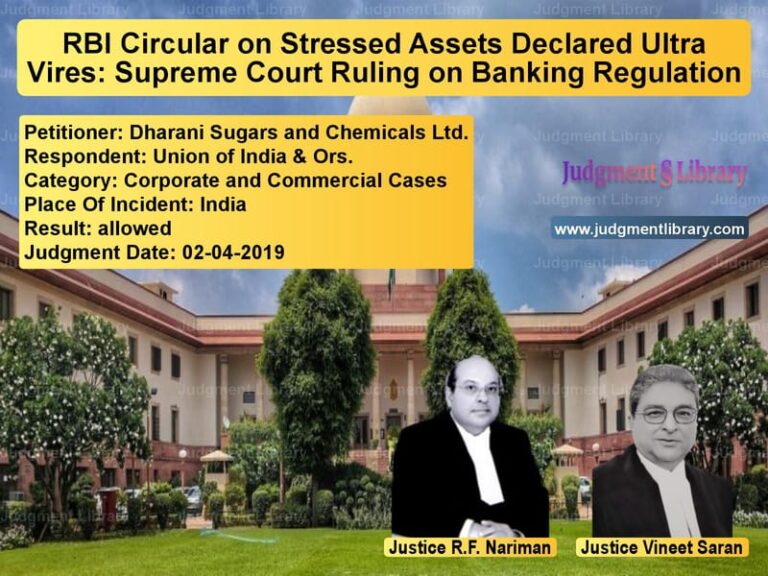Supreme Court Clarifies Tax Adjustments Under UP Trade Tax Act: State Development Tax Interpretation
The case of Commissioner of Trade Tax, U.P. & Ors. vs. Santosh Kumar Kushwaha addresses a crucial issue in taxation law, particularly concerning the applicability of the State Development Tax (SDT) under the U.P. Trade Tax Act, 1948. The Supreme Court’s ruling clarifies the adjustment of SDT within the monetary limits specified in exemption certificates under Section 4-A of the Act.
This appeal arose when the Commissioner of Trade Tax, Uttar Pradesh, challenged the High Court’s ruling that permitted the adjustment of SDT within the exemption limits granted to manufacturers. The Supreme Court upheld the High Court’s decision, affirming that the State Development Tax must be adjusted within the monetary limit of the eligibility certificates issued under Section 4-A.
Background of the Case
The case revolves around the interpretation of Section 3-H of the U.P. Trade Tax Act, which was inserted on May 1, 2005. This provision introduced the State Development Tax, a tax levied at a rate not exceeding 1% of taxable turnover on dealers whose aggregate turnover exceeded Rs. 50 lakh.
The primary legal questions in the case were:
- Whether the State Development Tax could be adjusted within the monetary limit specified in the eligibility certificates issued under Section 4-A.
- Whether the tax was an independent levy or a continuation of the existing trade tax regime.
- The effect of the amendment to Section 4-A, which stated that exemptions would apply “notwithstanding anything contained in any other provisions except Section 3-H.”
Arguments Presented by the Petitioner (Commissioner of Trade Tax, U.P.)
The petitioner contended:
- The State Development Tax was an independent levy and could not be adjusted within the monetary limit specified under Section 4-A.
- Adjustments under Section 4-A only applied to trade tax and not to additional levies like SDT.
- The monetary limit in the eligibility certificate referred only to exemptions under the U.P. Trade Tax Act, not to separate taxes imposed under Section 3-H.
- The High Court erred in holding that SDT should be adjusted within the overall exemption limit.
Arguments Presented by the Respondent (Santosh Kumar Kushwaha & Others)
The respondents, who were manufacturers granted exemptions under Section 4-A, argued:
- The phrase “notwithstanding anything contained in any other provisions except the provisions of Section 3-H” in Section 4-A allowed for SDT adjustment within the exemption limit.
- The U.P. Government’s own circulars clarified that SDT was to be adjusted in the same manner as trade tax exemptions.
- The State Development Tax was not a separate tax but was part of the overall tax structure, meaning it should be subject to the same exemptions.
Supreme Court’s Observations and Verdict
The Supreme Court examined the relationship between Section 3-H and Section 4-A of the U.P. Trade Tax Act and made the following key observations:
- Section 3-H(3) expressly states that the State Development Tax shall be adjustable within the monetary limit specified in the eligibility certificates issued under Section 4-A.
- The eligibility certificates provided a fixed exemption limit based on turnover, and SDT must be included in that limit.
- The legislative intent behind inserting Section 3-H was not to impose a separate tax but to supplement the existing trade tax framework.
- The State of U.P. had itself issued circulars stating that SDT should be adjusted in the same manner as other trade taxes.
- The High Court correctly interpreted the adjustment mechanism, and there was no need for further interpretation beyond the clear language of the statute.
Based on these findings, the Supreme Court ruled:
- The appeal was dismissed.
- The High Court’s order allowing the adjustment of SDT within the exemption limits was upheld.
- Trade tax authorities in Uttar Pradesh must adjust SDT within the total exemption limit granted under Section 4-A.
Legal Precedents Considered
The Supreme Court referred to multiple judgments on tax interpretation and statutory exemptions:
- State of Uttar Pradesh vs. M/s Systematic Conscom Ltd. (2014): Held that SDT was an independent tax but must be read in conjunction with existing trade tax exemptions.
- Commissioner of Customs vs. Dilip Kumar & Co. (2018): Reaffirmed that tax exemptions should be interpreted strictly, but where ambiguity exists, the benefit should go to the taxpayer.
- State of U.P. vs. Om Prakash Gupta (2005): Clarified that exemption certificates must be interpreted as per their plain wording.
Impact of the Judgment
This ruling has significant implications for trade and taxation in Uttar Pradesh:
- It establishes that State Development Tax must be adjusted within the monetary limit of the exemption certificate.
- It clarifies that SDT is not an independent tax but part of the overall trade tax structure.
- It prevents excessive tax burdens on manufacturers who were granted exemptions under Section 4-A.
- It ensures that the government’s past circulars regarding SDT adjustments remain legally valid.
By upholding the High Court’s decision, the Supreme Court has provided much-needed clarity on the application of SDT, benefiting manufacturers and businesses operating under exemption schemes.
Petitioner Name: Commissioner of Trade Tax, U.P. & Ors..Respondent Name: Santosh Kumar Kushwaha.Judgment By: Justice Sanjiv Khanna, Justice Bela M. Trivedi.Place Of Incident: Uttar Pradesh.Judgment Date: 02-03-2022.
Don’t miss out on the full details! Download the complete judgment in PDF format below and gain valuable insights instantly!
Download Judgment: commissioner-of-trad-vs-santosh-kumar-kushwa-supreme-court-of-india-judgment-dated-02-03-2022.pdf
Directly Download Judgment: Directly download this Judgment
See all petitions in Tax Refund Disputes
See all petitions in GST Law
See all petitions in Judgment by Sanjiv Khanna
See all petitions in Judgment by Bela M. Trivedi
See all petitions in dismissed
See all petitions in Declared Infructuous
See all petitions in supreme court of India judgments March 2022
See all petitions in 2022 judgments
See all posts in Taxation and Financial Cases Category
See all allowed petitions in Taxation and Financial Cases Category
See all Dismissed petitions in Taxation and Financial Cases Category
See all partially allowed petitions in Taxation and Financial Cases Category







